Related Research Articles
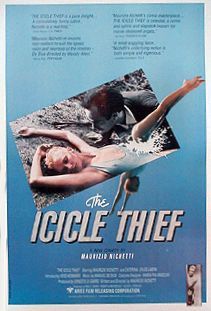
The Icicle Thief is a 1989 Italian comedy film directed by Maurizio Nichetti, titled in imitation of Vittorio De Sica's 1948 classic Italian neorealist film The Bicycle Thief. Some feel The Icicle Thief was created as a spoof of neorealism, which predominated Italian cinema after World War II. However, it is generally understood that the film is critical of the impact of consumerism on art, as suggested by the contrast between the nested film and commercials, and the apathy of Italian television viewers in recognising the difference between the two. The film won the Golden St. George at the 16th Moscow International Film Festival.

The Moscow International Film Festival is a film festival first held in Moscow in 1935 and became regular since 1959. From its inception to 1959, it was held every second year in July, alternating with the Karlovy Vary festival. The festival has been held annually since 1999. In reaction to the 2022 Russian invasion of Ukraine, the FIAPF paused the accreditation of the festival until further notice.
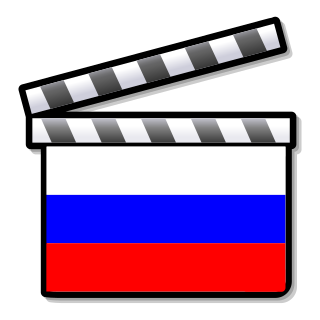
The cinema of Russia began in the Russian Empire, widely developed in the Soviet Union and in the years following its dissolution. The Russian film industry would remain internationally recognized. In the 21st century, Russian cinema has become known internationally with films such as Hardcore Henry (2015), Leviathan (2014), Night Watch (2004) and Brother (1997). The Moscow International Film Festival began in Moscow in 1935. The Nika Award is the main annual national film award in Russia.

Maurizio Nichetti is an Italian film director, screenwriter and actor. His 1989 film The Icicle Thief won the Golden St. George at the 16th Moscow International Film Festival. In 1998 he was a member of the jury at the 48th Berlin International Film Festival.

Come Come Come Upward is a 1989 South Korean film directed by Im Kwon-taek.
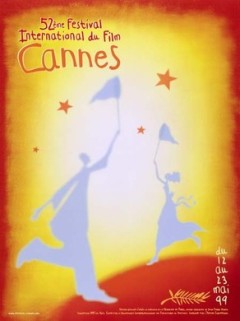
The 52nd Cannes Film Festival was held from 12 to 23 May 1999. Canadian filmmaker, actor and author David Cronenberg was the Jury President. The Palme d'Or went to the French–Belgian film Rosetta by Jean-Pierre and Luc Dardenne.
Zhang Junzhao was a Chinese film director and screenwriter who was mainly active in the 1980s. A graduate of the Beijing Film Academy and a contemporary of acclaimed directors Zhang Yimou, Chen Kaige, and Tian Zhuangzhuang, Zhang Junzhao was a prominent early member of China's Fifth Generation filmmakers. His 1984 film One and Eight is well known as the film that marked the advent of the Fifth Generation, while The Shining Arc (1988) was selected for competition for the Golden St. George award at the 1989 Moscow International Film Festival.
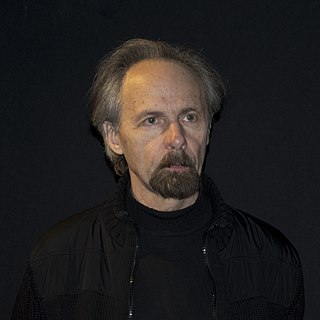
Konstantin Sergeyevich Lopushansky is a Soviet and Russian film director, film theorist and author. He is best known for directing the apocalyptic and post-apocalyptic films Dead Man's Letters (1986), A Visitor to a Museum (1989), Russian Symphony (1994), and The Ugly Swans (2006).
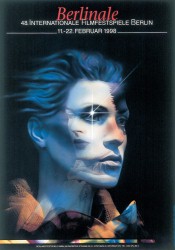
The 48th annual Berlin International Film Festival was held from 11 to 22 February 1998. The festival opened with the Irish film The Boxer by Jim Sheridan. Francis Ford Coppola's The Rainmaker was selected as the closing night film. The Golden Bear was awarded to Brazilian-French film Central Station directed by Walter Salles. The retrospective dedicated to Siodmak Bros., titled Siodmak Bros. Berlin – London – Paris – Hollywood was shown at the festival.

Luna e l'altra is a 1996 Italian fantasy film directed, written and starred by Maurizio Nichetti.
The 11th Moscow International Film Festival was held from 14 to 28 August 1979. The Golden Prizes were awarded to the Italian-French film Christ Stopped at Eboli directed by Francesco Rosi, the Spanish film Siete días de enero directed by Juan Antonio Bardem and the Polish film Camera Buff directed by Krzysztof Kieślowski.

A Visitor to a Museum is a 1989 Soviet post-apocalyptic drama film directed and written by Konstantin Lopushansky. It was entered into the 16th Moscow International Film Festival where it won the Silver St. George and the Prix of Ecumenical Jury.
The 17th Moscow International Film Festival was held from 8 to 19 July 1991. The Golden St. George was awarded to the Soviet-German film Spotted Dog Running at the Edge of the Sea directed by Karen Gevorkian.
The 18th Moscow International Film Festival was held from 1 to 12 July 1993. The Golden St. George was awarded to the French-Belarusian film Me Ivan, You Abraham directed by Yolande Zauberman.
The 19th Moscow International Film Festival was held from 17 to 28 July 1995. The Golden St. George was not awarded.
The 20th Moscow International Film Festival was held from 19 to 29 July 1997. The Golden St. George was awarded to the American film Marvin's Room directed by Jerry Zaks.
The 21st Moscow International Film Festival was held from 19 to 29 July 1999. The Golden St. George was awarded to the Japanese film Will to Live directed by Kaneto Shindo.
The 22nd Moscow International Film Festival was held from 19 to 29 July 2000. The Golden St. George was awarded to the Polish-French film Life as a Fatal Sexually Transmitted Disease directed by Krzysztof Zanussi.
The 23rd Moscow International Film Festival was held from 21 to 30 June 2001. The Golden St. George was awarded to the American film The Believer directed by Henry Bean.

Russian Symphony is a 1994 Russian psychological drama film directed by Konstantin Lopushansky and starring Viktor Mikhaylov. The narrative is set in a dark version of contemporary Russia where the world seems to be coming to an end through a flood. A man is desperate to do something good with his life before it ends, but is mostly met with suspicion.
References
- ↑ "16th Moscow International Film Festival (1989)". MIFF. Archived from the original on 16 March 2013. Retrieved 24 February 2013.